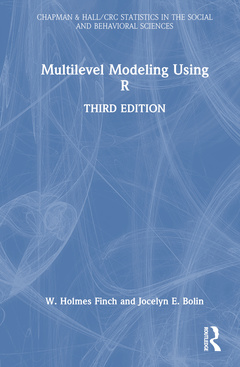Multilevel Modeling Using R (3rd Ed.) Chapman & Hall/CRC Statistics in the Social and Behavioral Sciences Series
Auteurs : Finch W. Holmes, Bolin Jocelyn E.

Like its bestselling predecessor, Multilevel Modeling Using R, Third Edition provides the reader with a helpful guide to conducting multilevel data modeling using the R software environment.
After reviewing standard linear models, the authors present the basics of multilevel models and explain how to fit these models using R. They then show how to employ multilevel modeling with longitudinal data and demonstrate the valuable graphical options in R. The book also describes models for categorical dependent variables in both single-level and multilevel data.
The third edition of the book includes several new topics that were not present in the second edition. Specifically, a new chapter has been included, focussing on fitting multilevel latent variable modeling in the R environment. With R, it is possible to fit a variety of latent variable models in the multilevel context, including factor analysis, structural models, item response theory, and latent class models. The third edition also includes new sections in Chapter 11 describing two useful alternatives to standard multilevel models, fixed effects models and generalized estimating equations. These approaches are particularly useful with small samples and when the researcher is interested in modeling the correlation structure within higher-level units (e.g., schools). The third edition also includes a new section on mediation modeling in the multilevel context, in Chapter 11.
This thoroughly updated revision gives the reader state-of-the-art tools to launch their own investigations in multilevel modeling and gain insight into their research.
1. Linear models 2. An introduction to multilevel data structure 3. Fitting level-2 models in R 4. Level-3 and higher models 5. Longitudinal data analysis using multilevel models 6. Graphing data in multilevel contexts 7. Brief introduction to generalized linear models 8. Multilevel generalized linear models (MGLMs) 9. Bayesian multilevel modeling 10. Multilevel latent variable models 11. Additional modeling frameworks for multilevel data 12. Advanced issues in multilevel modeling
Holmes Finch is a Professor in the Department of Educational Psychology at Ball State University where he has been since 2003. He received his PhD from the University of South Carolina in 2002. Dr. Finch teaches courses in factor analysis, structural equation modeling, categorical data analysis, regression, multivariate statistics and measurement to graduate students in psychology and education. His research interests are in the areas of multilevel models, latent variable modeling, methods of prediction and classification, and nonparametric multivariate statistics. Holmes is also an Accredited Professional Statistician (PStat ®).
Jocelyn Bolin received her PhD in Educational Psychology from Indiana University Bloomington in 2009. Her dissertation consisted a comparison of statistical classification analyses under situations of training data misclassification. She is now an Assistant Professor in the Department of Educational Psychology at Ball State University where she has been since 2010. Dr. Bolin teaches courses on introductory and intermediate statistics, multiple regression analysis and multilevel modeling for graduate students in social science disciplines. Her research interests include statistical methods for classification and clustering and use of multilevel modeling in the social sciences. She is a member of the American Psychological Association, the American Educational Research Association and the American Statistical Association. Jocelyn is also an Accredited Professional Statistician (PStat ®).
Ken Kelley is the Edward F. Sorin Society Professor of IT, Analytics, and Operations (ITAO) and the Senior Associate Dean for Faculty and Research in the Mendoza College of Business at the University of Notre Dame. Professor Kelley is in the analytics group within the ITAO Department and works to advance analytic methods in his research in a variety of ways from a variety of perspectives to improve the methods used in human-centered research,
Date de parution : 04-2024
15.6x23.4 cm



